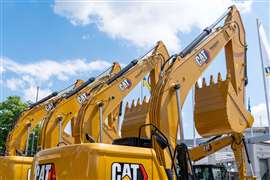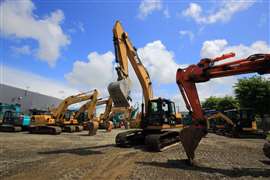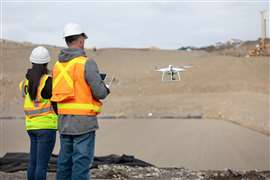'Change is good' says Ritchie Bros CEO Peter Blake
28 January 2013

Peter Blake, CEO of Ritchie Bros, tells Murray Pollok that the company will soon be meeting the needs of people who don’t like to buy or sell equipment at unreserved auctions.
If anybody understands the flows of construction equipment around the world it is Peter Blake, chief executive officer of Ritchie Bros Auctioneers, the Canadian company that organises used equipment auctions from sites all around the world.
For IRN’s benefit he briskly runs through some of the key features of today’s construction equipment market: the importance of energy and natural resources in determining demand; the reversal in flows of used equipment out of and now back to the US; transfers of equipment from China to Africa; and the problems of excess fleets in Europe (he tries logging onto a live Ritchie Bros auction in Ocaña, Spain, to demonstrate).
He concludes that, for Ritchie Bros, “any change is good. We are an agnostic platform, like Switzerland. We’re somewhere you can buy any brand from anybody and take it anywhere, and at a price that anyone can see.”
That aim, of being an independent facilitator of equipment flows, is what brings Mr Blake and his colleagues to Shanghai for the announcement at bauma China that the company will hold its first Chinese auction in Spring this year.
Auctions are still an unknown quantity in China and Ritchie will be the first company to attempt an equipment auction in the country. Is he concerned that Chinese buyers and sellers will take to the concept?
No, is the short answer. “The first auction will be more about processes going smoothly, so that people say, ‘that was easy’. The Chinese people are very smart and savvy about how auctions work. We’ve done it in all different types of cultures – people come a watch, and they get it as soon as they see. It takes two or three minutes.”
Although not expecting an enormous first auction, Ritchie Bros venture in China is well timed, since China is undergoing its first major construction equipment slump for over a decade, meaning that there are thousands of surplus machines on the books of OEMs, dealers and contractors.
Mr Blake says there was “no grand design to pounce on China now. There is more equipment available today than before, but that’s just part of the ebb and flow. It has taken us nine years to get to this point – it’s a long term investment.”
The Chinese auction is just the latest development in Ritchie Bros unfolding story. Established in Edmonton, Canada, in 1958, the now multinational company sold US$3.9 billion worth of equipment last year at 328 unreserved auctions from sites around the world.
If the China auction launch is a significant event, there are other initiatives that are also occupying Mr Blake’s mind. Over the past decade and more the company has been investing $160-170 million each year in expanding existing auction sites or adding new ones. The company had 13 sites when it went public back in 1998 and now has 44.
That investment level has now been scaled back to nearer $60 million each year because the existing infrastructure is capable of growing the business by 50%. That means $6 billion in sales without any more sites.
For Mr Blake, there is a bigger question: how to reach those equipment sellers and buyers who don’t want to use auctions. “$200 billion is the value of the space we are in – construction and agriculture – every year”, he tells IRN, “Roughly half the marketplace says, ‘actually, no thanks, I’d rather not buy or sell at an auction’.”
One way of looking at that is that Ritchie Bros is getting almost $4 billion in revenues from a $100 million “addressable market”. Another is that Ritchie Bros still has half of the global used equipment market to go for.
“The people who say ‘yes’ are looking for global market value and certainty of transaction – that’s why they come to auctions”, says Mr Blake, “The ‘nos’ are looking for control of the process and control of prices. You can’t get that at an unreserved auction.” (The point about an unreserved auction is that the seller cannot set a minimum sale price.)
Mr Blake says Ritchie Bros will not offer reserved auctions to meet the needs of these auction-shy buyers and sellers. Instead, Ritchie looked at all the selling platforms that might work, including eBay and Craig’s List, and is now in the process of developing an alternative solution having acquired last year the online auctioneer AssetNation.
Mr Blake is unwilling to say too much about how its alternative sales channel will work – the launch will be this Spring (with an initial launch taking place in January (see news story here) – but he describes AssetNation’s technology as “out of this world. It will give customers control of price and control of process. They want to haggle, they want to control it.”
Houston-based AssetNation gives Ritchie e-commerce expertise as well as access to a customer base in sectors including energy, transport fleets, insurance and government.
He highlights some of the difficulties in buying equipment from eBay by searching on his iPad for a Cat bulldozer and coming up with all sorts of things, including scale models and oil filter kits. The new system “won’t even be eBay-ish. It will be like a listing service on steroids”, he says.
He gives another example of the difficulties in buying several machines from a site like eBay, with complicated transport logistics in dealing with different sellers in different territories. He says the new Ritchie Bros offering will be a “full-service environment.”
There are other wider challenges as well. $3.9 billion in sales sounds like a lot, but there are still opportunities to expand that. For example, sales from its auctions in Canada alone are around $1 billion while sales from the US – which would be eight times larger if judged by the size of the market – are only double the Canadian figure.
Growing its sales in markets like the US will mean spreading the auction message and will require a combination of patience and persistence, says Mr Blake; “Too persistent and you alienate people, too patient and you grow too slowly.”
The competition from online companies like IronPlanet is also rising. Mr Blake points out that Ritchie Bros has been taking online bids since 2002 and that last year around $1 billion of its sales were online. “Already we’re significantly larger than IronPlanet”, he says, “We have five million unique visitors to our site and one million was added this year [2012].”
Changes in engine regulations are another source of uncertainty for a business that depends on machines being transported freely around the world. Machines from strict-emission territories like Europe, North America and Japan may end up being difficult or impossible to sell in less-regulated regions (and vice versa), by virtue of the fuels and additives required or because of the degree of maintenance required.
Mr Blake is sanguine; “I don’t think people know how it will work. ‘De-tiering’ is one solution – look at JCB for example. But if you look at US/Canada, Japan and Europe, it’s still a pretty big market place.”
He speculates that when the dust settles there may be two global blocks, with some trading between them. “I think there is a little bit of Y2K going on [a reference to the millennium computer bug that never transpired]. Don’t undersell the power of basic commerce – people will figure out how to do things. I don’t lose any sleep over it.”
And don’t forget, change is good.






